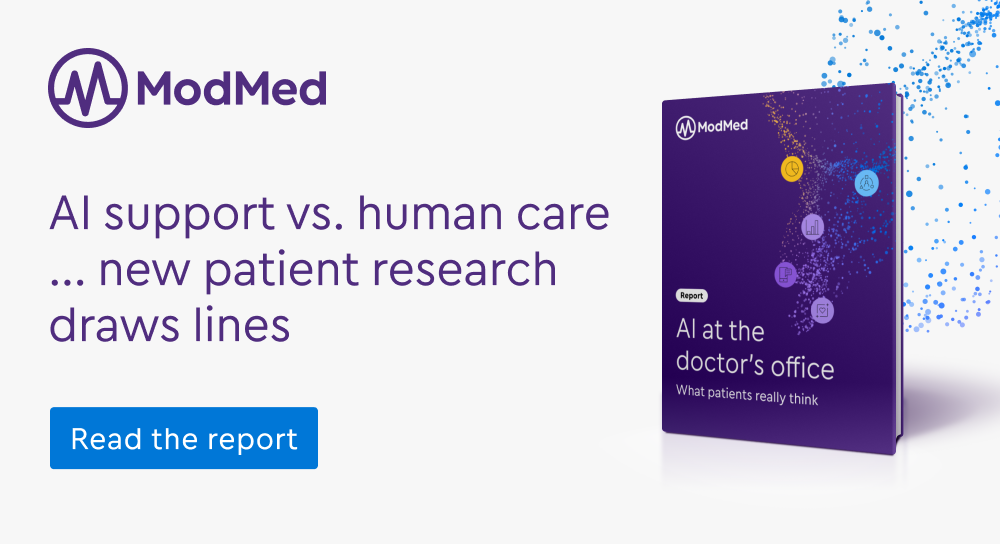Choosing the Right Healthcare AI: 8 Essential Questions to Ask

Finding the right AI for your practice can be difficult, but asking yourself these questions can help you make the right choice
Artificial intelligence (AI) is here, and its use in healthcare is growing fast. With so many options available, it can be hard to know which tools are right for your practice. Keep reading to cut through the noise, explore practical uses of healthcare AI and learn eight key questions to ask before choosing a solution.
The future of healthcare is a future with AI
The US market for AI is predicted to exceed $800 billion by 2030.1 Healthcare is a part of the AI boom. In 2023 alone, the US Food and Drug Administration approved 223 AI-enabled medical devices.2
Chances are, you’re already using some form of AI software in your medical practice. Many EHR systems and healthcare technology solutions have integrated AI features. However, if your current vendor doesn’t use AI to help streamline your workflow, now is the time to consider one that does. Your patients may even prefer it. According to “AI at the Doctor’s Office: What Patients Really Think,” a report commissioned by ModMed®, over half of the patients surveyed preferred that their doctor’s office use AI if it led to a better experience.3
8 questions to ask yourself when choosing AI for your practice
As you explore AI for your medical practice, use these eight questions to start the decision-making process. They can help you compare features and evaluate benefits so you can choose the right software for you.
1. What pain points would I like AI to solve?
Don’t start with the tool, start with the problem. Meet with your team to identify pain points that AI could help address. Invite everyone to the discussion, and talk over specifics such as physician and staff burnout, workflow roadblocks or reimbursement concerns.
For instance, would your front desk staff like to reduce patient wait time? Are physicians struggling to complete visit notes during work hours? Pinpoint challenges to help you set realistic goals around where AI could, or could not, help your practice.
2. What are the unique needs of my specialty?
AI in healthcare is not one-size-fits-all. Some AI can meet basic needs, but solutions tailored to your specialty are often more effective. Take your practice’s clinical focus into account and search for AI tools designed for it.
Specialty-specific AI ambient listening solutions, like ModMed Scribe, are designed to “speak the language” of your field, which could help improve ease of use and efficiency. You may want to prioritize AI that will understand your specialty’s unique medical terminology. For example, if a dermatologist says, “I’m going to freeze this,” a well-designed ambient listening tool will know that liquid nitrogen is being applied and can suggest this for the visit note.
3. What would fit into my current workflow?
Evaluate your existing technology stack, including everything from scheduling software to billing tools. What’s working? What’s not? Then, review the patient journey, starting at check-in and ending with billing, to uncover likely opportunities for improvement. Check if your practice relies on parallel software programs that don’t communicate back and forth with your main system. This can require cumbersome software bridges — applications that help two systems share information but can create workflow bottlenecks, such as extra login steps, slow data transfer or errors that need manual correction.
Instead, prioritize interoperability — the ability for different systems to exchange data seamlessly — and choose AI software that integrates with your EHR. For example, ModMed’s AI-powered ambient listening software was designed to streamline manual documentation and work alongside its EHR, EMA®, to simplify downstream clinical workflows, including provider-ordered prescriptions, patient education materials and common lab orders.
4. Can I trust the software provider to manage data responsibly?
Secure AI for healthcare is essential. Ask the vendor about privacy and security policies. You should choose AI tools that help protect sensitive patient data. Choosing trustworthy healthcare AI is an important part of maintaining compliance and protecting patient information.
Data transparency is especially important to patients. In the “AI at the Doctor’s Office” report, 72% of patients responding said it was important for them to know the source of data used to train AI models, and 83% agreed there should be safety standards in place regarding the quality and accuracy of AI used for clinical treatment and diagnosis.3
Think about asking your prospective AI vendors where their training data is from and how they protect against bias in AI models. Tools that qualify as a Predictive Decision Support Intervention (PDSI) in EHRs and are supplied as part of certified EHR technology are subject to rigorous intervention risk management and transparency requirements. Tools supplied by a certified EHR developer, like ModMed Scribe, may help your medical practice focus its use of AI on products that are fair, valid and effective.
5. Will this software help my staff focus on what matters most?
AI should support, not replace, your team. It’s important that healthcare decisions remain in the hands of medical professionals. Even in situations where AI suggests clinical pathways, providers should have the final word.
The right AI solution will help automate repetitive tasks so staff can focus on patient interactions, while still retaining human oversight when appropriate. Consider technology such as the AI-powered ModMed Scribe, which can transcribe conversations with patients and simplify documentation. Or AI faxing that categorizes inbound faxes and recognizes and suggests the relevant patient and provider names so office staff can focus on providing in-person service.
6. What do my patients think about AI?
Understanding patient perspectives is key to introducing AI thoughtfully. Healthcare remains deeply personal, so a careful approach to AI integration is essential to building patient trust and providing a positive experience for everyone involved.
The AI at the Doctor’s Office report revealed a layered view among patients surveyed. For instance, over 50% said they were open to AI at the doctor’s office if it led to better experiences, such as more quality time with their doctors. However, some worried about AI accuracy and its access to patient financial information.3 Have ongoing conversations with your patients to help address their concerns.
7. What does the implementation of AI-powered technology look like?
Every new tool has a learning curve. Evaluate your resources and consider what implementation will look like for your practice. Ask vendors about onboarding, training and continued support.
Keep in mind potential short-term workflow changes, too. Will your practice need to reduce patient volume for a brief time? Will you need to schedule providers for dedicated training? Preparation will help enable a smoother implementation, which means your team can gain the benefits of AI sooner.
8. How will my healthcare team measure the success of our AI tool?
Success should be measurable. Set clear goals and decide what outcomes you will track. By aligning AI performance data with your goals, you’ll have a better picture of the tool’s impact on your practice.
If documentation is a bottleneck, measure charting time before and after using an AI-powered ambient listening solution. If you want to improve claim approvals, track denial rates before and after using an AI tool designed to flag claims that have a higher likelihood of denial.
AI in healthcare: A tool, not a takeover
We all know AI in healthcare can spark debate. But the best tools are often working quietly in the background to help medical practices focus on what truly matters — providing great care to patients.
Implementing AI in healthcare is an investment, but one that can pay off through better patient experiences, enhanced billing processes and streamlined clinical operations. Connect with the team at ModMed to learn how real practices have used AI-powered healthcare software to transform their workflows. Your success story could be next.
1 Thormundsson, B. “Global AI Market Size Forecast.” Statista. 2024.
2 Stanford Institute for Human-Centered Artificial Intelligence (HAI). “AI Index Report 2025.” April 2025.
3 ModMed. “AI at the Doctor’s Office.” 2025.
This blog is intended for informational purposes only and does not constitute legal, medical, or compliance advice. Please consult with your legal counsel and other qualified advisors to ensure compliance with applicable laws, regulations, and standards.








